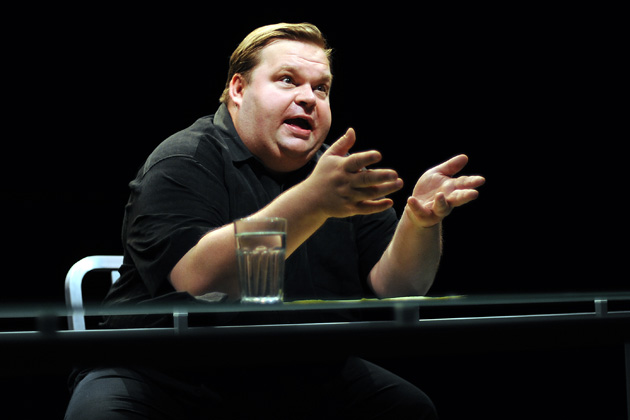Arts Commentary: Monologuist Mike Daisey — No Apologies
The issues raised by Mike Daisey’s infraction, his fall from grace, and now his return, are many, but chief among them is the privilege of illusion, the birth-right of the artist.
By Iris Fanger
Earlier this month, comedian Mike Daisey performed his latest work-in-progress, The Orient Express (Or, the Value of Failure) at Falmouth Academy, under the auspices of the Cape Cod Theatre Project, a summer season troupe that has presented book-in-hand first readings of new plays for the past 17 years.
You might remember the previous outing by this monologist-par-excellence, The Agony and Ecstasy of Steve Jobs, which created a firestorm of criticism and angst when a smart reporter discovered that Mr. Daisey had lied on stage. The Steve Jobs piece was framed as a first-hand, journalistic account of Daisey’s trip to China to investigate labor abuses by the Apple Corporation at the factories where iPads and iPhones are manufactured.
Strangely enough, the stories were true and had been already reported in the press—if not at the factory that Daisey identified but elsewhere—however, no one seemed to have noticed that during the ensuing kerfuffle. None-the-less, when it was revealed that Daisey exaggerated, fantasized, and substituted stage truth for an eye witness report, the collective rage of the critics, sparked by the This American Life radio program, took off like the wildfires in Colorado.
Equally interesting, in the new work, Daisey never mentions Steve Jobs, Apple Corp, China, or This American Life by name—neither does he apologize. But make no mistake, The Orient Express (Or, the Value of Failure) is based on his reaction to and recovery from the scandal—a word that is often uttered throughout the 90-minute work.
Early in the monologue, delivered in the style of the late Spalding Gray, one man, seated at a table, a glass of water and a legal pad placed before him, Daisey makes two salient facts clear. The first is that his heart has been broken; the second is that he is an “unreliable” person. That’s all, aside from what follows—a riveting monologue whose delivery is punctuated by his mesmerizing gaze, directed straight at the audience, expansive gestures, and a series of self-generated sound effects. The embellishments expertly accent the stories he interweaves into a latter-day, male version of the ordeal of Scheherazade. The latter’s life was also wagered on the stories she told.
The spine of the work seems to be a journey in exile he made after the scandal occurred. He mentions visits to Berlin, Prague, Budapest, and Istanbul, but it is a hard to follow the piece’s time-line because Daisey might be recalling earlier visits abroad, or he might be using the notion of travel as a metaphor for the existentialist wandering forced on him from his calling as a performer and storyteller. He mentions his director and collaborator (also his partner and wife of 15 years), Jean-Michele Gregory, describing moments when their work and their marriage intersected.
Yet, by the end, we understand that Daisey will not be deterred from his profession. He likens himself to a man in Istanbul who, long ago, who donned a metal set of wings and took off from a tower, flying across a watery expanse and landing safely on the other side. The ruler was so incensed that he gave the flier a bag of gold coins but exiled him from the country because humans were not made to fly. Daisey comments that he, too, will cross the divide (perhaps between him and the audience, or the critics), even if he must find another way to do so.
The issues raised by Daisey’s infraction, his fall from grace, and now his return are many, but chief among them is the privilege of illusion, the birth-right of the artist. Must an artist be a journalist? Is stage truth a verity that exists only under the theater lamps, to vanish when scrutinized in the daylight? Do we grant an artist the freedom to lead us beyond facts and accepted mores?
During the performance I could not help but think about what an actor Mr. Daisey would make. I would kill to see him in as a character in a Samuel Beckett play, cast as Falstaff or as Judge Brack in Ibsen’s Hedda Gabler. Mr. Daisey needs to cast a wider net for his talents, the self-righteous among us be damned.
Tagged: Cape Cod Theatre Project, Falmouth Academy, Mike Daisey, The Orient Express (Or


